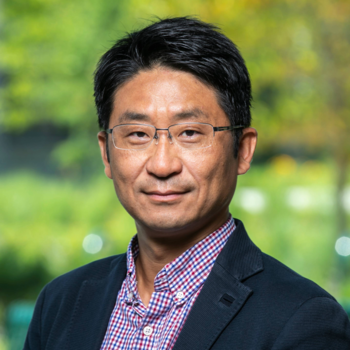In This Story
High-achieving students interested in cybersecurity may be eligible for to receive stipends of $27,000 per year for undergraduate students and $37,000 per year for graduate students, along with tuition and a professional allowance of $6,000 per academic year through George Mason’s new Empowering American Government Leadership in Security through Education (EAGLE) program.
A faculty team from the Department of Cyber Security Engineering (CYSE) and the Department of Information Sciences and Technology secured a $3.9-million grant from the National Science Foundation (NSF)’s CyberCorps® Scholarship for Service (SFS) program to support cybersecurity students intent on working for the U.S. government after graduation.

Over the next five years, EAGLE will support twelve undergraduate students, nine master's students, and two PhD students, explained Kun Sun, the program’s Principal Investigator (PI).
"We have a strong team," said Sun, referring to co-PIs Tanvir Arafin, Peggy Brouse, Paulo Costa, and Jianli Pan. Arafin, Brouse, and Costa are CYSE faculty and members of George Mason's Center of Excellence in Command, Control, Communications, Computing, Cyber, and Intelligence (C5I Center) while Sun and Pan, both IST faculty, work in George Mason’s Center for Secure Information Systems.
EAGLE is an ambitious initiative aimed at bolstering the cybersecurity workforce within U.S. government agencies such as the National Security Agency, the Department of Energy, and military branches, addressing the critical need for skilled professionals in the field.
In addition to financial support, the program offers students valuable opportunities for expert advice and hands-on experience. Each scholarship recipient is paired with an advisor from a committee comprising faculty members from both IST and CYSE, who will meet with students regularly to discuss their progress. Students will also complete summer internships with government agencies, which recruit from CyberCorps SFS programs. So, not only do scholarship recipients receive a generous stipend, but they will also benefit from significant professional development opportunities.
"This is a huge undertaking, but with a strong team and dedicated students, we are confident in our ability to make a meaningful impact," Sun said.
Costa, CYSE chair and C5I Center director, highlighted the significance of the program, saying, "This is a major step in establishing the College of Engineering and Computing as a national leader in cybersecurity education."
The EAGLE program is highly selective, aiming to attract top-tier students who demonstrate both academic excellence and a commitment to public service.
"We want to make sure we get good students who will maintain a high GPA, successfully graduate, and join a government agency," Sun said. Students interested in applying can find more information at sfs.cec.gmu.edu/prospective-students/.
